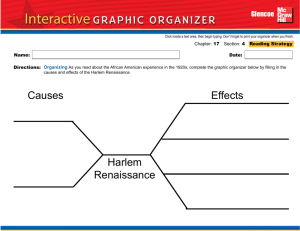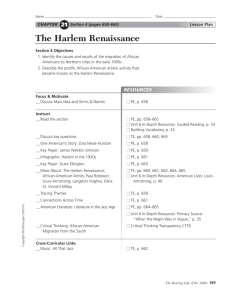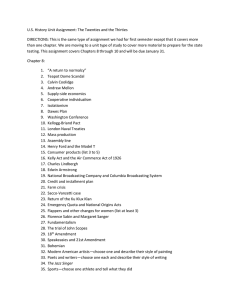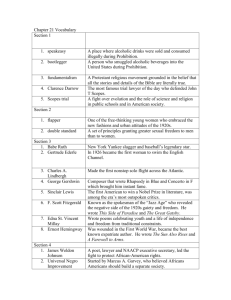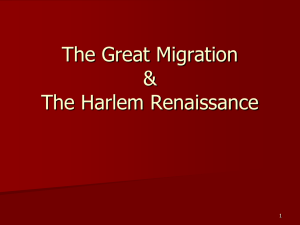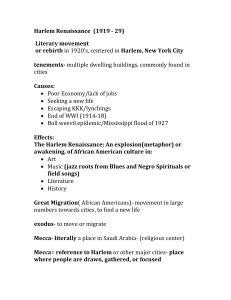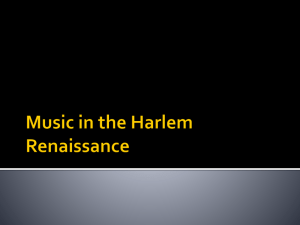The Great Migration & The Harlem Renaissance
advertisement
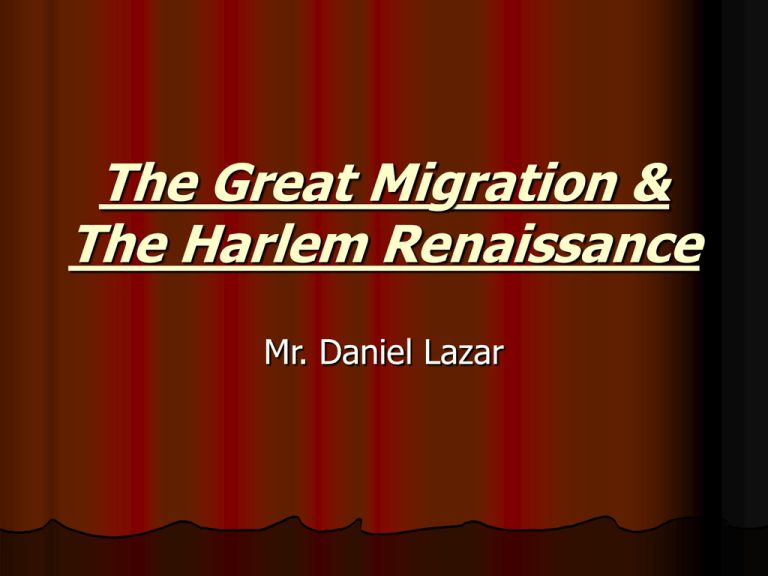
The Great Migration &
The Harlem Renaissance
Mr. Daniel Lazar
The Great Migration
•
Push Factors
•
Racial Violence
•
•
•
Economic Repression
•
•
•
•
Share cropping
Tenant Farming
KKK: Boycotts and Intimidation
Political Repression
•
•
•
Rise of the KKK
Lynching
Jim Crow Laws
Sundown Towns
Environmental Devastation
•
•
Volatile Weather of 1915-16 (drought and flood)
Boll Weevil
The Great Migration
•
Pull Factors
•
•
•
•
•
Economic Opportunity?
Political Rights
Unity and Solidarity
Hope
Mystery, Adventure and Myths
The Great Migration
•
What Migrants Brought With Them
•
•
•
•
Economic Despair
Illiteracy
Political inexperience
Experiences & Memories
•
•
•
•
Hopes and Dreams
Fear & Despair
Racism & Prejudice
Culture: music, poetry, prose, visual art…
The Great Migration
Where African-Americans Migrated To & Why
Primarily Chicago, Detroit and NY
•
•
•
•
Also: St. Louis, Indianapolis, Philadelphia
Industrial Towns with Booming Industries
Towns With Supportive Networks
Robert Johnson is the most important blues musician who ever lived. I have never found
anything more deeply soulful. His music remains the most powerful cry that I think you
can find in the human voice.
---Eric Clapton
The Twelve-Bar Blues
{1----2----3----4----}
{5----6----7----8----}
{9----10----11----12----}
*12 Bar and Repeat
*Bars 11-12 are turnaround to Bar 1 (The Top)
The Harlem Renaissance
"We younger Negro artists now intend to
express our individual dark-skinned selves
without fear or shame. . . . We build our
temples for tomorrow, as strong as we know
how and we stand on the top of the
mountain, free within ourselves."
--Langston Hughes, "The Negro Artist
and the Racial Mountain"
The Harlem Renaissance
"Harlem is romantic in its own right. And it is
hard and strong, its noise, heat, cold, cries
and colours are so. And the nostalgia is
violent too; the eternal radio seeping
through everything day and night, indoors
and out, becomes somehow the
personification of restlessness, desire,
brooding."
--Nancy Cunard “Harlem Review”
The Harlem Renaissance
"The true spirit of jazz is a joyous revolt from
convention, custom, authority, boredom,
even sorrow--from everything that would
confine the soul of man and hinder its riding
free on the air."
--J.A. Rogers, "Jazz at Home,"
Causes of The Harlem Renaissance
•
The Migration & Overcrowding
•
•
•
•
•
•
•
Harlem 1920-1929 = 150,000 to 330,000
An international movement: The South, West
Indies, Cuba, Puerto Rico, Jamaica
Overcrowding and Poverty (a mixed
blessing?)
Economic Bubble of 1920’s
Liberation of Women in 1920’s
Growth of Cities & New Urban Scene
Media: Radio & Newspapers
African-American Writers
Claude McKay
“If We Must Die”
If we must die, let it not be like hogs
Hunted and penned in an inglorious spot,
While round us bark the mad and hungry dogs,
Making their mock at our accursed lot.
If we must die, O let us nobly die,
So that our precious blood may not be shed
In vain; then even the monsters we defy
Shall be constrained to honor us though dead!
O kinsmen! we must meet the common foe!
Though far outnumbered let us show us brave,
And for their thousand blows deal one deathblow!
What though before us lies the open grave?
Like men we'll face the murderous, cowardly pack,
Pressed to the wall, dying, but fighting back!
African-American Writers
Claude McKay
“White Houses”
Your door is shut against my tightened face,
And I am sharp as steel with discontent;
But I possess the courage and the grace
To bear my anger proudly and unbent.
The pavement slabs burn loose beneath my feet,
A chafing savage, down the decent street;
And passion rends my vitals as I pass,
Where boldly shines your shuttered door of glass.
Oh, I must search for wisdom every hour,
Deep in my wrathful bosom sore and raw,
And find in it the superhuman power
To hold me to the letter of your law!
Oh, I must keep my heart inviolate
Against the potent poison of your hate.
African-American Writers
Langston Hughes
“Dream Deferred”
What happens to a dream deferred?
Does it dry up
Like a raisin in the sun?
Or fester like a sore-And then run?
Does it stink like rotten meat?
Or crust and sugar over-like a syrupy sweet?
Maybe it just sags
like a heavy load.
Or does it explode?
“If you have to ask what jazz is, you’ll never understand”
--Armstrong
Louis Armstrong Quotes and Tributes
"Armstrong is to music what Einstein is to physics
and the Wright Brothers are to travel."
-- Ken Burns
"He left an undying testimony to the human
condition in the America of his time"
-- Wynton Marsalis
"Americans, unknowingly, live part of every day in
the house that Satch built"
--Leonard Feather
Louis Armstrong Quotes and Tributes
"I think that anybody from the 20th century, up to
now, has to be aware that if it wasn't for Louis
Armstrong, we'd all be wearing powdered wigs. I
think that Louis Armstrong loosened the world,
helped people to be able to say "Yeah," and to
walk with a little dip in their hip. Before Louis
Armstrong, the world was definitely square, just
like Christopher Columbus thought."
-- South African trumpeter Hugh Masekela
Duke Ellington
Ellington the Quotable
“It don’t mean a thing if it ain’t got that swing.”
“Art is dangerous. It is one of the attractions: when it ceases to be
dangerous you don't want it.”
“Put it this way: Jazz is a good barometer of freedom… In its
beginnings, the United States of America spawned certain ideals
of freedom and independence through which, eventually, jazz
was evolved, and the music is so free that many people say it is
the only unhampered, unhindered expression of complete
freedom yet produced in this country.”
Themes of Harlem Renaissance
Visual Art
1. The exoticizing of Africa and Africanness. Glorification of
Blackness
2. African-American History, Slavery Identity and Pride
3. Primitivist theme: used for and against the black race.
4. Vitality of African-American Community
5. Racism and Discrimination
6. The exploring of sexual themes
7. Religion
8. Night Life
9. Family Life
10. Other Arts: dance, music, poetry
11. International Perspective
AARON DOUGLAS
“ASPECTS OF NEGRO LIFE FROM SLAVERY
TO RECONSTRUCTION”
Aaron Douglas
“In an African Setting”
WILLIAM H. JOHNSON
“GOING TO CHURCH”
William H. Johnson
“Mount Calvary”
William H. Johnson
“Chain Gang”
Palmer Hayden
“Nous Quatre a Paris”
Palmer Hayden
“Jeunesse”
Paul Colin
“Ball Negre”
Archibald Motley
“Street Scene in Chicago”
Archibald Motley
“Blues”
Why Did The Harlem Renaissance
End?
•
•
•
•
•
The Great Depression
The Migration toned down and communities settled
Gentrification of Communities
Fundamentalists cursed the devil’s music and art
It didn’t…it evolved
•
•
•
Rock & Roll, Motown, Hip Hop, Rap
Commercialization: Elvis, Gershwin, Sinatra, etc.
Intellectual movements ever end. They live on in
the minds of men and women.
Legacy of the Harlem Renaissance
Paradox: art as a release of, and contributor to,
tensions
The white audience
Glorification & sophistication of African-American
life and culture
A perplexing sense of optimism in HR art
Cultivation of Afrocentrism
Black Pride & The Civil Rights Movement
Cultivation of economic vitality
A Revolution in American Art, Music and Culture
An International Phenomenon
The End

